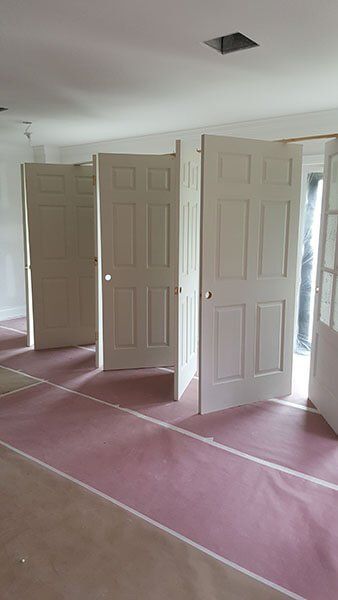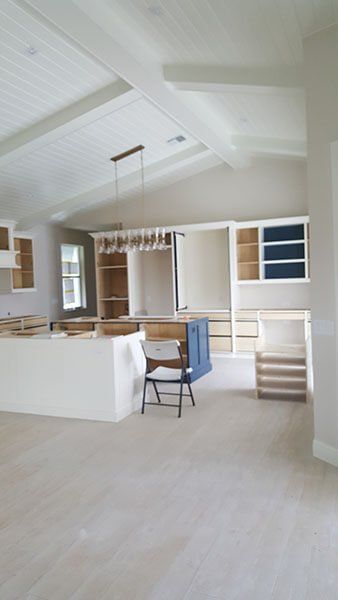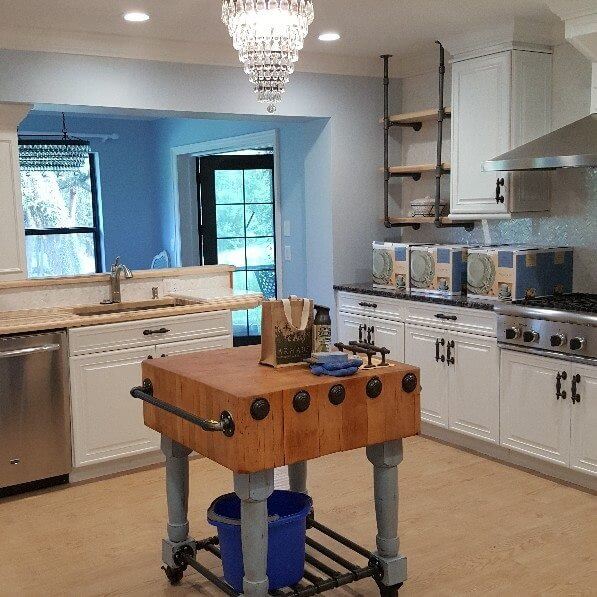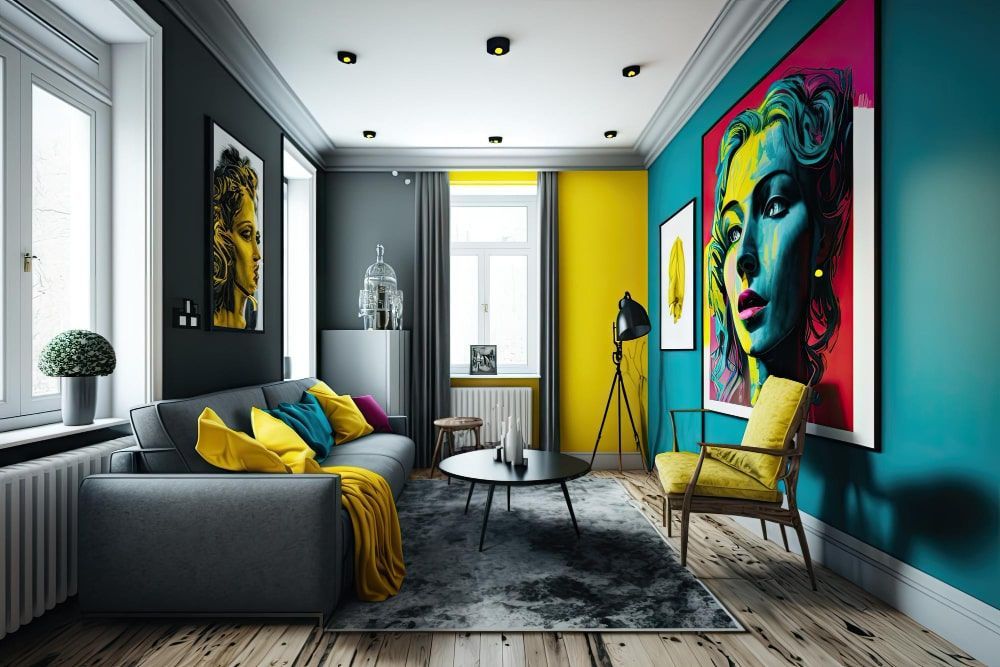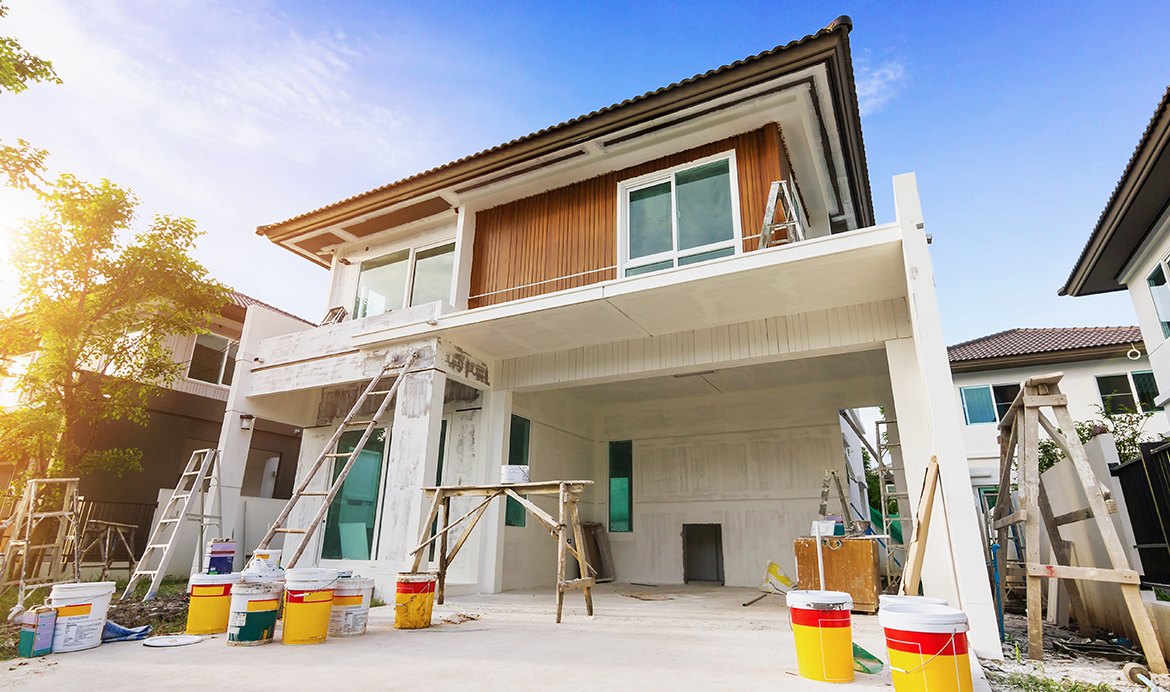Transform Your Home with Expert Residential Painting Services: Find, Hire, and Enhance with a Local Painter!
Are you looking to give your home a fresh new look? Whether you're planning a complete makeover or just want to add a splash of color, residential painting can transform your living space and breathe new life into your home. But with so many options and considerations, it can be overwhelming to tackle a painting project on your own. That's where hiring a professional residential painter comes in.
In this blog post, we will guide you through the process of finding, hiring, and enhancing your home with the help of a local painter. We'll explore the definition of residential painting and why it's important to entrust this task to a skilled professional. We'll also provide an overview of the residential painting process and the benefits of hiring a local painter.
Finding the right residential painter is crucial to achieving the desired results. We'll discuss how to research local painting companies, read reviews and testimonials, and check for proper licensing and insurance. Additionally, we'll provide tips on how to request estimates, compare prices, and verify credentials and experience.
Once you've found the perfect residential painter, we'll delve into the services they offer. From interior painting, including walls, ceilings, and trim, to exterior painting of siding, doors, and windows, we'll cover the range of options available. We'll also explore additional services such as cabinet painting and refinishing, drywall repair, and epoxy floor coating.
To ensure a successful residential painting project, we'll outline the key steps involved in the process. From the initial consultation and color selection to surface preparation, priming, painting techniques, and final touches, we'll guide you through each stage. We'll also provide tips for preparing your home, choosing the right paint and colors, and maintaining your newly painted surfaces.
Introduction to Residential Painting
Are you tired of the same old look of your home? Do you want to breathe new life into your living space? Residential painting is the answer you've been looking for. Whether you're planning a complete home makeover or simply want to add a fresh coat of paint, hiring a professional residential painter can make all the difference. In this section, we will explore the definition of residential painting, the importance of hiring a professional, and provide an overview of the residential painting process.
Definition of Residential Painting
Residential painting refers to the process of applying paint or other finishes to the interior and exterior surfaces of a home. It involves transforming the look and feel of a residential property through the use of color, texture, and technique. From walls and ceilings to doors, windows, and even cabinets, residential painting encompasses a wide range of surfaces and areas within a home.
Importance of Hiring a Professional Residential Painter
While some may consider residential painting as a DIY project, there are several reasons why hiring a professional residential painter is a wise decision. First and foremost, professionals have the skills, knowledge, and experience necessary to deliver high-quality results. They understand the intricacies of different surfaces, know the best techniques to achieve a flawless finish, and have access to the right tools and materials.
Additionally, professional residential painters can offer valuable advice on color selection, helping you choose the perfect shades to enhance your home's aesthetics and create the desired ambiance. They can also provide guidance on the latest trends and finishes, ensuring your home stays up-to-date and visually appealing.
Another significant advantage of hiring a professional residential painter is the time and effort saved. Painting an entire home can be a time-consuming and physically demanding task, especially if you lack experience or have a busy schedule. By entrusting the job to professionals, you can focus on other priorities while they take care of every aspect of the painting process, from preparation to clean-up.
Overview of the Residential Painting Process
The residential painting process typically involves several key steps to achieve a flawless and long-lasting finish. It begins with an initial consultation, where you discuss your vision, preferences, and expectations with the residential painter. During this stage, the painter may also provide color consultation to help you choose the ideal palette for your home.
Once the colors and finishes are finalized, the next step is surface preparation. This includes cleaning the surfaces, repairing any damages or imperfections, and ensuring a smooth and even base for the paint application. Surface preparation is a crucial stage as it directly impacts the final result and the longevity of the paint.
After the surfaces are prepped, the residential painter will apply primer, which helps the paint adhere better and provides a uniform base. Once the primer is dry, the actual painting process begins. The painter will use their expertise to apply the paint using the appropriate technique, whether it's brushing, rolling, or spraying, to achieve a flawless and professional-looking finish.
Finally, after the paint has dried, the residential painter will inspect the work to ensure quality and address any touch-ups that may be needed. The clean-up process is also an essential part of the residential painting process, as it involves removing any debris, protecting furniture and fixtures, and leaving your home looking fresh and tidy.
In the next section, we will guide you through the process of finding the right residential painter for your project. We'll provide tips on researching local painting companies, reading reviews, and checking credentials. Let's dive in and discover how to make the best choice for your painting needs.
Finding the Right Residential Painter
Finding the right residential painter is a crucial step in ensuring a successful painting project. With numerous options available, it's important to do your research and make an informed decision. In this section, we will discuss the steps you can take to find the perfect residential painter for your needs. From researching local painting companies to comparing prices and verifying credentials, we'll guide you through the process.
- Researching Local Residential Painting Companies:
Start by researching local residential painting companies in your area. You can do this through online searches, local directories, or by asking for recommendations from friends, family, or neighbors who have recently had their homes painted. Look for companies that specialize in residential painting and have a good reputation for quality work.
Take the time to visit their websites and explore their portfolios. Look for examples of their previous projects to get a sense of their style and expertise. Pay attention to the level of detail and precision in their work. This will give you an idea of the quality you can expect from them.
- Reading Reviews and Testimonials:
Reading reviews and testimonials from previous clients is an excellent way to gauge the reputation and reliability of a residential painting company. Look for reviews on trusted platforms such as Google, Yelp, or Angie's List. Pay attention to both positive and negative feedback and consider the overall rating and sentiment of the reviews.
Positive reviews can indicate a company's professionalism, attention to detail, and customer satisfaction. On the other hand, negative reviews can highlight potential issues or areas of improvement. However, it's important to consider the context and the overall consensus before making a judgment.
- Checking for Proper Licensing and Insurance:
Before hiring a residential painter, it's essential to check if they have the proper licensing and insurance. A reputable painter will be licensed to operate in your area, and they should be able to provide proof of their credentials upon request. Licensing ensures that the painter has met certain standards and regulations, giving you peace of mind that they are qualified for the job.
Insurance is equally important as it protects you and the painter in case of accidents or damages that may occur during the painting process. Ask the painter for a copy of their insurance certificate and verify its validity with the insurance provider.
- Requesting Estimates and Comparing Prices:
Once you have shortlisted a few residential painting companies, it's time to request estimates and compare prices. Contact each company and provide them with the details of your project, including the size of the area to be painted, the type of surfaces involved, and any specific requirements or preferences you may have.
When comparing estimates, it's important to consider not only the total cost but also the breakdown of the pricing. Look for transparency in the estimate, including details of the materials to be used, the number of coats of paint, and any additional charges for preparation or cleanup. Keep in mind that the lowest price may not always guarantee the best quality, so consider the overall value and reputation of the company as well.
- Verifying Credentials and Experience: Before making a final decision, take the time to verify the credentials and experience of the residential painter. Ask for references from previous clients and reach out to them to inquire about their experience with the painter. Did the painter meet their expectations? Was the project completed within the agreed timeframe? Were there any issues or concerns?
You can also ask the painter for examples of their certifications or awards, which can further demonstrate their expertise and commitment to quality. Additionally, inquire about the experience of the painters themselves. Are they trained professionals with years of experience in residential painting? Do they stay up-to-date with the latest techniques and trends in the industry?
By following these steps and conducting thorough research, you'll be well on your way to finding the right residential painter for your project. In the next section, we will explore the range of services offered by residential painters, from interior to exterior painting and beyond.
Services Offered by Residential Painters
Residential painters offer a wide range of services to cater to the diverse painting needs of homeowners. From transforming the interiors to enhancing the exteriors, these professionals have the expertise and skills to deliver exceptional results. In this section, we will explore the various services offered by residential painters, including both interior and exterior painting, as well as additional services that can elevate the aesthetic appeal of your home.
Interior Painting Services
Interior painting is one of the primary services offered by residential painters. Whether you want to refresh the look of a single room or give your entire home a makeover, professional painters can help you achieve your desired results. Here are some of the key interior painting services provided by residential painters:
- Painting Walls, Ceilings, and Trim: Residential painters can skillfully paint the walls, ceilings, and trim of your home, ensuring smooth and even coverage. They can handle various surfaces, including drywall, wood, and plaster, and provide expert advice on color selection and finishes.
- Repainting and Color Consultation: If you're looking to update the color scheme of your home, residential painters can assist with repainting. They can help you choose the perfect colors that complement your decor and create the desired ambiance.
- Wallpaper Removal and Surface Preparation: If you have outdated wallpaper that you wish to replace with a fresh coat of paint, residential painters can handle the removal process. They will also prepare the surface by patching any imperfections, sanding, and priming, ensuring a smooth and flawless result.
Exterior Painting Services
Enhancing the exterior of your home not only improves its curb appeal but also protects it from the elements. Residential painters offer a range of exterior painting services to transform the look of your home's façade. Here are some of the services you can expect:
- Painting Siding, Doors, and Windows: Whether you have vinyl, wood, or stucco siding, residential painters can revitalize its appearance with a fresh coat of paint. They can also paint exterior doors and windows, providing a cohesive and polished look to your home's exterior.
- Deck and Fence Staining: If you have a deck or fence, residential painters can apply stain or sealant to protect the wood from weathering and enhance its natural beauty. This service not only adds visual appeal but also helps prolong the life of your outdoor structures.
- Power Washing and Surface Cleaning: Before painting the exterior surfaces, residential painters often utilize power washing techniques to clean off dirt, grime, and mildew. This ensures a clean and smooth surface for the paint to adhere to, resulting in a longer-lasting finish.
Additional Services
In addition to interior and exterior painting, residential painters may also offer a range of additional services to enhance the overall look and feel of your home. These services include:
- Cabinet Painting and Refinishing: If you want to update your kitchen or bathroom cabinets without the cost of replacement, residential painters can professionally paint or refinish them. This service can give your cabinetry a fresh and modern appearance.
- Drywall Repair and Texturing: Residential painters often have the skills to handle minor drywall repairs, such as patching holes or fixing cracks. They can also apply texture to walls, adding depth and visual interest to your interior spaces.
- Epoxy Floor Coating: If you have a garage or basement, residential painters may offer epoxy floor coating services. This durable and attractive coating can transform your concrete floors, providing a seamless and easy-to-clean surface.
By offering a comprehensive range of services, residential painters can cater to all your painting needs, both inside and outside your home. In the next section, we will delve into the step-by-step process involved in residential painting, providing valuable insights to ensure a successful project.
Steps Involved in Residential Painting
Residential painting involves a series of steps to ensure a smooth and professional finish. From the initial consultation to the final touch-ups, each stage plays a vital role in achieving the desired results. In this section, we will walk you through the step-by-step process involved in residential painting, providing insights into what you can expect during your painting project.
Initial Consultation and Color Selection: The first step in the residential painting process is the initial consultation with your chosen painter. During this meeting, you will discuss your vision, preferences, and goals for the project. The painter will assess the scope of work, take measurements, and provide recommendations based on their expertise.
One of the key aspects of the initial consultation is color selection. The painter will guide you through various color options, considering factors such as lighting, room size, and existing decor. They may provide color samples or even create a mock-up to help you visualize the end result. Together, you will determine the color scheme that best suits your taste and complements your home's aesthetics.
Surface Preparation and Repair: Before any paint is applied, proper surface preparation is crucial for achieving a flawless finish. The surfaces to be painted need to be clean, smooth, and free from any imperfections. The painter will start by cleaning the surfaces, removing dust, dirt, and grease. They may use mild detergents or specialized cleaners depending on the surface material.
Next, the painter will inspect the surfaces for any damages, such as cracks, holes, or peeling paint. These issues will be addressed by repairing or patching the affected areas. The painter will use appropriate materials and techniques to ensure a seamless and even surface, ready for paint application.
Priming and Painting Techniques: Once the surfaces are prepped, the next step is priming. Primer acts as a base layer that enhances adhesion and provides a consistent surface for the paint. It helps to seal porous surfaces, covers stains, and promotes paint durability. The painter will choose the appropriate primer based on the surface material and the type of paint to be applied.
After the primer is dry, the actual painting process begins. The painter will use their expertise to apply the paint using the most suitable techniques for the surface and desired finish. They may use brushes, rollers, or sprayers depending on the area being painted. Multiple coats of paint may be applied to achieve the desired depth and coverage, with sufficient drying time between each coat.
Throughout the painting process, the painter will ensure precision and attention to detail, addressing any drips, streaks, or uneven coverage. They will work meticulously to achieve a smooth and professional-looking finish that enhances the beauty of your home.
Clean-Up and Final Touches: Once the painting is complete, the residential painter will conduct a thorough clean-up. They will remove any paint cans, drop cloths, and other materials used during the project. They will also ensure that any furniture, fixtures, or flooring that were protected during the painting process are returned to their original positions.
As part of the final touches, the painter will inspect the painted surfaces and address any minor imperfections or touch-ups that may be needed. They will ensure that the lines are crisp, corners are sharp, and the overall finish is flawless. This attention to detail ensures that you are left with a beautifully painted home that exceeds your expectations.
Inspection and Customer Satisfaction: Before officially completing the project, the residential painter will conduct a final inspection in collaboration with you. This is an opportunity to review the results and address any concerns or touch-up requests you may have. The painter will make sure that you are completely satisfied with the finished product and that it meets the agreed-upon standards.
At this stage, the painter may also provide guidance on how to care for and maintain your freshly painted surfaces. They may offer recommendations on cleaning methods, touch-up kits, or any specific precautions to take to preserve the longevity and beauty of the paint.
By following these step-by-step procedures, residential painters ensure that your painting project is carried out with precision and professionalism. In the next section, we will share valuable tips to help you achieve a successful residential painting project, from preparing your home to maintaining your newly painted surfaces.
Tips for a Successful Residential Painting Project
Embarking on a residential painting project requires careful planning and execution to ensure a successful outcome. From preparing your home for the painting process to maintaining the freshly painted surfaces, there are several factors to consider. In this section, we will provide you with valuable tips to help you achieve a smooth and successful residential painting project.
Preparing Your Home for the Painting Process
Proper preparation is key to a successful painting project. Here are some tips to help you prepare your home for the painting process:
- Clear the Area: Remove furniture, decor, and other items from the rooms or areas to be painted. Clearing the space allows the residential painter to work efficiently without any obstacles. If moving furniture is not possible, cover it with drop cloths or plastic sheets to protect it from paint splatters.
- Cover Floors and Fixtures: Protect your floors by covering them with drop cloths or plastic sheets. This will prevent paint drips and spills from damaging your flooring. Additionally, cover fixtures such as light fixtures, outlets, and switches to protect them from paint splatters or accidental damage.
- Repair Damaged Surfaces: Before the residential painter arrives, take the time to inspect the surfaces to be painted for any damages. Patch any holes, cracks, or imperfections to ensure a smooth and even surface for the paint to adhere to.
Choosing the Right Paint and Colors
Selecting the right paint and colors can greatly impact the overall look and feel of your home. Consider the following tips when choosing paint and colors for your residential painting project:
- Quality of Paint: Invest in high-quality paint that offers durability and longevity. Quality paint not only provides better coverage but also resists fading, chipping, and peeling over time. Consult with your residential painter or visit a reputable paint store for recommendations.
- Consider Lighting: Take into account the lighting conditions in each room when choosing paint colors. Natural light can affect how colors appear in a space. Consider testing paint samples in different lighting conditions to ensure you achieve the desired effect.
- Create a Cohesive Look: Maintain a cohesive look throughout your home by considering the flow and continuity of colors. Choose complementary colors that harmonize with existing elements, such as furniture, flooring, and decor.
Communicating Your Expectations with the Residential Painter
Clear and effective communication with your residential painter is crucial to ensure that your expectations are met. Consider the following tips for effective communication:
- Provide Detailed Information: Clearly communicate your preferences, expectations, and any specific requirements you may have. Discuss your desired finish, color choices, and any other details that are important to you.
- Ask Questions: Don't hesitate to ask questions and seek clarification if something is unclear. A reputable residential painter will be happy to address your concerns and provide explanations.
- Maintain Open Communication: Throughout the project, maintain open lines of communication with your painter. Regularly check in on the progress and address any issues or changes that may arise.
Maintaining Your Painted Surfaces
To preserve the beauty and longevity of your freshly painted surfaces, proper maintenance is essential. Consider the following tips for maintaining your painted surfaces:
- Cleaning: Regularly clean your painted surfaces using a mild cleaner and a soft cloth or sponge. Avoid abrasive cleaners or scrub brushes that could damage the paint.
- Touch-Ups: Keep some extra paint in a labeled container for future touch-ups. Over time, walls may get scuffed or damaged, and having the right paint on hand will allow you to quickly fix any minor imperfections.
- Avoid Moisture and Excessive Heat: Moisture and excessive heat can damage paint. Take precautions to avoid prolonged exposure to high humidity or extreme heat, especially in areas such as bathrooms, kitchens, and near heat sources.
By following these tips, you can ensure a successful residential painting project that meets your expectations and enhances the beauty of your home. In the next section, we will address some common questions and concerns related to residential painting, providing valuable answers to help you make informed decisions.
Frequently Asked Questions about Residential Painting
As you embark on your residential painting project, it's common to have questions and concerns. In this section, we will address some frequently asked questions about residential painting, providing you with valuable answers and insights to help you make informed decisions.
Q: How long does a residential painting project typically take?
The duration of a residential painting project can vary depending on various factors, such as the size of the area to be painted, the complexity of the project, and the number of coats required. Generally, a standard-sized room can be painted within a few days, while larger projects may take a week or more. It's important to discuss the timeline with your residential painter during the initial consultation.
Q: How do I choose the right finish for my paint?
The choice of paint finish depends on the desired look and functionality of the painted surface. Here are some commonly used paint finishes and their characteristics:
- Flat or Matte Finish: Offers a smooth and non-reflective appearance, ideal for hiding surface imperfections. It is commonly used for ceilings and low-traffic areas.
- Eggshell Finish: Provides a subtle sheen and is easy to clean, making it suitable for living rooms, bedrooms, and hallways.
- Satin Finish: Offers a slightly higher sheen and is more durable than eggshell. It works well in areas prone to moisture, such as kitchens and bathrooms.
- Semi-Gloss Finish: Provides a higher sheen and is highly durable. It is commonly used for trim, doors, and cabinets, as it is easy to clean and resistant to moisture.
- Gloss Finish: Offers the highest level of sheen and durability. It is often used for accentuating architectural features or creating a dramatic effect.
Consider the purpose of the room, the level of traffic, and your personal preferences when choosing the right finish for your paint.
Q: Can I paint over wallpaper?
Painting over wallpaper is possible, but it requires careful consideration and proper preparation. It's important to assess the condition of the wallpaper and the type of wallpaper adhesive used. If the wallpaper is in good condition and firmly adhered to the wall, you can paint over it after ensuring that the surface is clean and smooth. However, if the wallpaper is peeling, damaged, or has a textured surface, it's advisable to remove it before painting for a smoother and more professional result.
Q: How often should I repaint my home?
The frequency of repainting your home depends on several factors, including the quality of the paint used, the climate in your area, and the level of wear and tear. Generally, interior walls may need repainting every 5 to 10 years, while exterior surfaces may require repainting every 7 to 15 years. However, it's important to inspect your painted surfaces regularly and look for signs of fading, peeling, or damage. If you notice any issues, it's best to address them promptly to maintain the appearance and protection of your home.
Q: Can I paint my home's exterior myself?
While it's possible to paint your home's exterior yourself, it's a complex and time-consuming task that requires specialized equipment, skills, and knowledge. Hiring a professional residential painter for your exterior painting project ensures that the surfaces are properly prepared, the right techniques are employed, and high-quality paint is used. Professionals have the expertise to handle different types of exterior surfaces and can ensure a long-lasting and visually appealing finish.
As you embark on your residential painting project, remember that these are just general answers to common questions. It's always best to consult with your residential painter for personalized advice and guidance based on your specific project and needs.
Conclusion
In this comprehensive guide to residential painting, we have explored the importance of hiring a professional residential painter, the range of services they offer, the step-by-step process involved in residential painting, tips for a successful project, and frequently asked questions. By following these insights and recommendations, you can achieve a beautiful and transformative outcome for your home.
Remember, when it comes to residential painting, it's essential to invest in quality materials, hire a skilled professional, and communicate your expectations clearly. With the expertise and guidance of a residential painter, you can transform your living space, enhance its aesthetic appeal, and create a home that you'll love for years to come.
If you're in Venice, Florida and are ready to embark on your residential painting project, don't hesitate to reach out to the highly recommended Paint Masters Painting Contractors LLC, known as the best residential painting service provider in the area. You can contact them at (941) 237-1660. They will be more than happy to provide you with estimates, discuss your ideas, and guide you through the entire process. Get started today and enjoy the benefits of a beautifully painted home.

